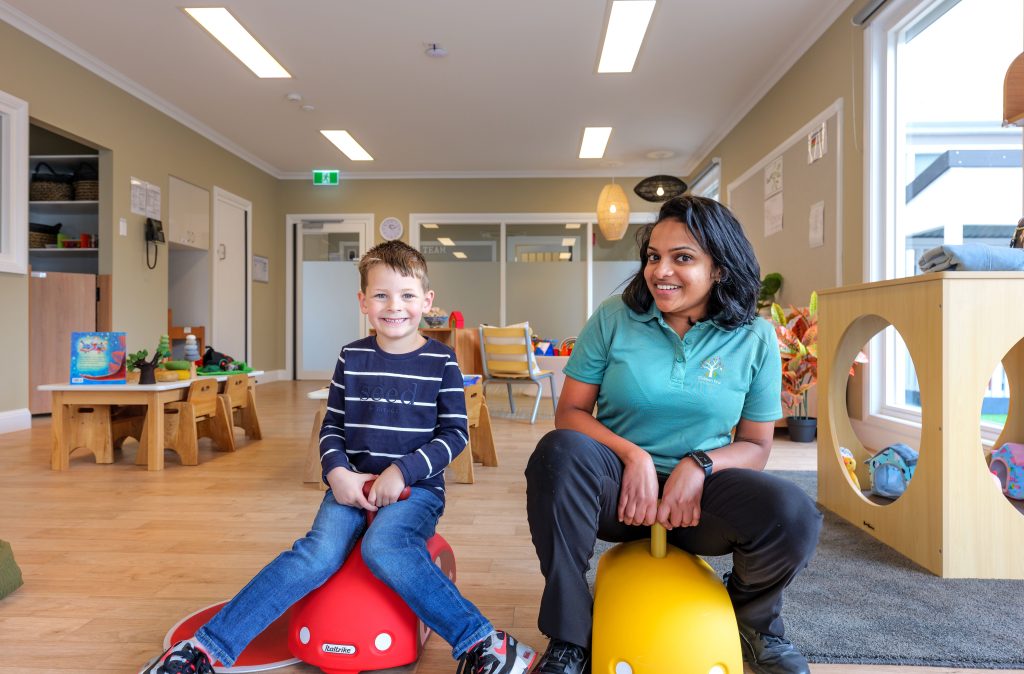Learning through play stands as one of the most pivotal ways children acquire knowledge and evolve. Educators in early childhood education and care services frequently employ a "play-based" approach to facilitate children's learning and development.
You may have noticed that as a parent, you typically don't need to encourage children to play or offer external incentives for play. This is because children possess an innate inclination to play, and the sheer pleasure and fascination they derive from it are enough to sustain their engagement.
At Children First, we place a strong emphasis on play as an important context for learning. Our play-based curriculum allows children to explore ideas, make connections, solve problems, and engage with others in a social setting.

How Play Supports Your Child's Development and Learning
Physical Development: Active play involving both large and small muscle groups, such as climbing, running, ball games, digging, jumping, and dancing, contributes to children's overall health and well-being. It also fosters physical growth, an appreciation for active lifestyles, and skills for independence in self-help tasks like dressing and feeding.
At Children First, we provide large outdoor spaces so your child will have enough room for big movements like running, jumping, kicking and throwing, which is very important for fitness and physical development. Our state-of-the-art outdoor spaces are further supported by providing extra-curricular activities (included in our daily fee) focused on physical development. Common extra-curriculars offered by our centres include multi-sports classes, yoga, music & movement and gardening classes.
Social and Emotional Development: Dramatic and imaginative play, which encompasses activities like dressing up and role-playing, nurtures positive social and emotional skills and values. It offers opportunities for children to:
- Practice collaboration, idea negotiation, and decision-making with peers.
- Build self-confidence by experiencing both success and challenges.
- Develop emotional control by acting out feelings or events that may be causing them distress.
- Cultivate empathy and fairness as they play alongside and interact with other children.
At Children First, you'll discover a series of smaller spaces in our classrooms, brimming with a wide array of highly engaging learning resources. Home corner, activity tables, floor activities, dress up racks, and other captivating play areas, all thoughtfully arranged to encourage dramatic and imaginative play.
Cognitive Development: Whether playing individually or with peers, children's cognitive skills, including thinking, memory, learning, and attention, are continually honed. Play aids in:\
- Problem-solving.
- Harnessing imagination and creativity.
- Grasping concepts like shapes, colours, measurement, counting, and letter recognition.
- Developing strengths such as concentration, persistence, and resilience.
Literacy and Numeracy Development: Play engages thinking, language, interactions, curiosity, and exploration, leading to the acquisition of skills and insights such as:
- Enhanced vocabulary and language skills.
- Improved listening and speaking abilities.
- Early writing skills through activities like scribbling, painting, and drawing.
- Understanding the mechanics of storytelling, including plot, characters, structure, and word placement on a page.
- Recognising that objects can represent other things (e.g., a block as a telephone), laying the groundwork for formal reading, spelling, and numeracy, as letters, words, symbols, numerals, and signs are part of symbol systems.
- Realising that letters, words, symbols, numerals, and signs serve a purpose and convey meaning to others.

At Children First, all our educational resources are hand-picked to ensure they complement our curriculum, build on your child’s interests and development, and enhance their learning experience.
What Does a Play-Based Learning Approach Look Like?
Educators in early childhood education and care services utilize a wide array of play-based experiences for children's learning and development rather than relying on structured "lessons" or formal teaching methods. They create age-appropriate indoor and outdoor games that are safe and enjoyable for every child.
At Children First, our Educators promote learning through play by:
- Supplying resources that match children's ages, interests, knowledge, strengths, abilities, and cultural backgrounds, stimulating and supporting creative play.
- Designing play experiences based on assessments of individual differences, interests, developmental needs, and abilities. For example, as a child learns to grip a pencil for drawing and writing, educators provide objects of different sizes to help strengthen the child's fingers.
- Observing children at play to understand how they interact with others, the skills and understanding they demonstrate during play, and activities that can enhance their play skills.
- Participating in children's play to extend their learning and model skills such as reasoning, appropriate language, and positive behaviours.
- Allowing for extended, uninterrupted periods of child-initiated play, affording children the time to develop their ideas and games.

How You Can Contribute to Your Child's Learning Through Play
Children's success as learners’ hinges on strong foundations established from infancy. Play-based learning fosters essential skills, understandings, and dispositions crucial for your child's lifelong learning and well-being. You can support your child's learning through play by:
- Sharing information about your child's interests and abilities with their educators, enabling them to plan play experiences tailored to your child's interests and abilities.
- Engaging in play with your child.
- Holding discussions with your child's service educators about their program and the activities your child enjoys.
- Advocating for safe and stimulating play spaces within your local community.

It is our goal to provide all children attending our centres, with a play-based learning program that is engaging, enjoyable, and builds success for lifelong learning. If you’re interested in attending one of our amazing Children First centres, call us on 1300 004 111 or enquire via Contact Us page of this website.
